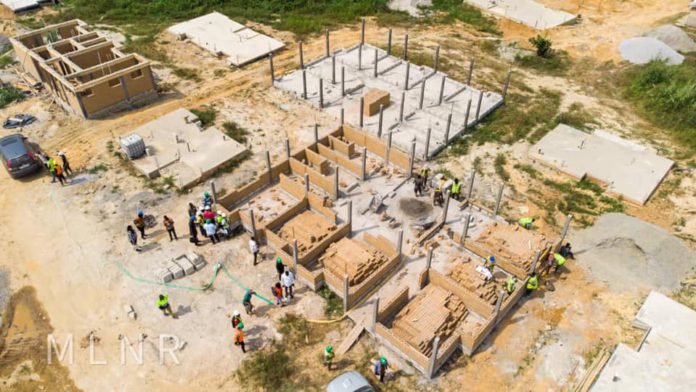The Deputy Minister for Lands and Natural Resources, Benito Owusu-Bio, has disclosed that all 124 housing units of Apiate which forms part of the first phase of the project are currently under various levels of construction.
Mr Owusu-Bio, who doubles as the Chairman of the Apiate Reconstruction Implementation Team, is, therefore, hopeful the project will be completed within the stipulated time frame.

This, he said is impressive work as the committee used about four months of the year time frame given by government to work on the temporary structures acquired from FGR to provide safe shelter for the people.
The Deputy Minister made this known when he led the Reconstruction Implementation Team to pay a working visit to Apiate on Wednesday, 18th January 2023 to among others, inspect the progress of work ahead of the one year anniversary.

Addressing the media, the Deputy Minister explained that all contractors who were trailing behind due to mushy lands at the beginning of the construction, have been relocated successfully, and therefore currently, all 124 housing units which is the core part of the Apiate township are being constructed.
He gave a brief on government’s interventions and efforts since the incident occurred a year ago: “20th January is exactly a year since this unfortunate incident occurred and as you are aware, so far government through the Minister for Lands and Natural resources, Samuel A. Jinapor has been working tirelessly to salvage the situation,” he said.

Taking the media through the process he recapped that “government through the Ministry, NADMO and other agencies provided tents, food and basic amenities at the initial stages of the incident, government also had to move the people into the temporary settlement provided by FGR when the rains set in, the Ministry on the instructions of government also set up the Apiate Support fund and the reconstruction team, while enforcing the safety laws to ensure that such an occurrence does not repeat itself.”
He continued that government also commiserated with the people of Apiate and helped buried the dead while providing medical assistance for the injured.

Sticking to their promise, Hon. Benito disclosed that GETFund has also commenced the construction of a six-block primary classroom and Kindergarten for children of school-going age at Apiate as their contribution towards the reconstruction of the township.
The Deputy Minister applauded their effort and called on other organisations who made similar commitments to follow the GETFund example and redeem their promise as the time to put actions to their words has come.

He indicated that road demarcations are currently underway with trenches and gutters to properly demarcate the walkways from the road and the buildings, giving the construction site a better outlook.
Hon. Owusu-Bio assured the media and the people of Apiate not to fret “as government has begun this good work, it shall surely bring it to a completion as promised.”
Mr Blankson-Hermans, a member of the ARIT team, spoke on the technical details of the construction, saying “so far the process is commendable because in terms of quality and speed, the most performing contractor is about 39% complete and the lowest performing contractor around 29% and considering our time frame and work schedule I believe it’s great to work and we will surely meet the time.”
He, however, hoped that the contractors will speed up work as he noted that when the rains set in, it may disrupt or delay the progress of work.

Responding to the question of government supporting some students in Apiate to the tertiary level, the Municipal Chief Executive of the Prestea Huni Valley Municipality, Mr Isaac Dasmani, said the Municipality is on top of welfare issues and so far one student has been successfully admitted at UMat with some others in the process to gain admission.
Hon. Benito, after his tour of the construction site, took the media to the temporary residence of the Apiate indigenes to give them an appreciation of their current state of living.

The media explored this opportunity to interview a number of indigenes of Apiate who testified that adapting to a whole new lifestyle was not easy at the beginning but with the support of government, the red cross and other organisations who visit every now and then to donate, they have survived.

